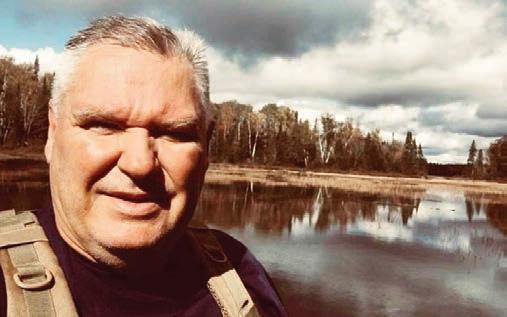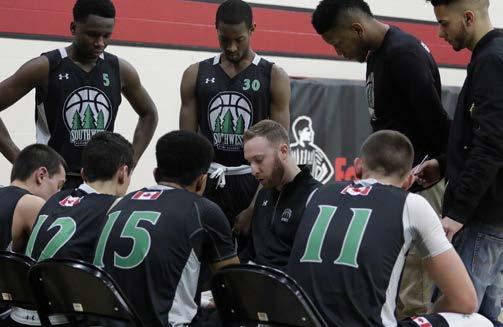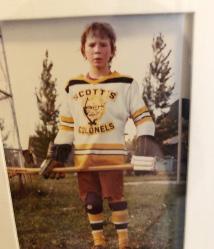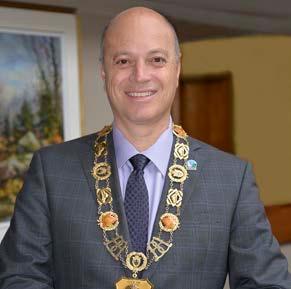32
TOTAL SPORTS QUINTE
HOCKEY DEVELOPMENT DURING A PANDEMIC
A Parent’s Guide to Dealing with the concerns of skill development during these times of uncertainty.
By Total Sports Staff
Overview This is a culmination and collaboration of thoughts and advice provided by our expert panel via a three part series on the Total Sports Quinte Podcast hosted by Randy Uens and Mike Bonn. The Podcast can be found through ITunes, Spotify, IHeartRadio or other podcast channels. The episodes involved interviews with Derek Smith, Head Coach of the Wellington Dukes, Chris Longo of the Kingston Frontenacs, Troy Mann and David Bell of the Belleville Senators and Darren Dreger, TSN Hockey Insider and longtime hockey parent. The roundtable format involved a question and answer session as well as comments from the coaches on their personal perspectives on hockey development. This article is only a small fraction of the great information provided in the podcasts and Total Sports encourages parents to listen to those interviews in their entirety, as they were incredibly beneficial and full of information. Hockey can be expensive and stressful for some to make decisions balancing finances and the pressures of developing young athletes and people. It’s a marathon and not a sprint. Patience and consistency pays off.
Key Takeaways from the Roundtable discussion. •
•
•
•
During this pandemic, ice time may be reduced with your own team. Coach Mann says” You need to find ways to get better. Work off ice. Take advantage of this downtime to work on those things you may not have had time to do in the past. Off ice conditioning is a great example of this.” Coaches can look at this period of downtime, as an opportunity to do the things other teams may not want to do. More skills, more individual development on and off ice. An average player may touch the puck for a total of 1 minute or less in an entire game. This added period of skill is an opportunity rather than a handicap. Do not fear that this will be a lost year of development. On average a rep player would play 60 games per year from the ages of 7 to 17. That is an average of 600 games in their minor hockey career. If they end up playing fewer games or even modified games it is only a small blip in the players overall development. Take advantage of this time for other types of development. Seek out other opportunities for skill development. Do your homework with skill providers. Who are they? What’s their background? Who have they worked with that has gone on to be successful? Ask for references. There are skill providers out there with professional hockey backgrounds and some without. You do not have to be an ex pro to be a great skill provider. You do have to be a great teacher and be able to break down drills and progressions. There are also skill providers out there that claim to have ties to NHL teams when in reality they are not necessarily “skill” guys or coaches with these teams but have another business connection. “Parents need to be aware of this smoke and mirrors.” Educate yourself by asking questions and getting references. Some skill providers have particular strengths that maybe help your athlete develop those attributes they are lacking. Spend your money wisely. Find parents that have kids that have moved on to higher levels. Who did they use? Do your due diligence and don’t buy into the marketing hype.
•
Make the training fun. The player needs to want to do it. Darren Dreger talks about recent NHL draft pick Cole Perfetti, “He is a hockey nut. He wants to be on the ice all of the time., He has that desire to get better.” The player has to have fun to get better.
•
It takes 10000 touches to master a skill but if you do it wrong 10000 times it is a waste of time and energy. Optimally you would want to be in a group of less than 6 people or be in a larger skate where the ratio is 5-1 players to coaches. Corrections need to be made to see improvement. Running through fancy drills with pylons are useless unless correct technique is followed and developed. Chris Longo says, “ Bad habits occur when you do drills too fast before mastering a skill. Slow it down first, correct the technique and then speed it up to achieve execution of the skill which then creates separation between yourself and other players.“ Skating sessions with one coach and more than 10 kids becomes a conditioning skate at best as no corrections can be done. In those scenarios improvement comes from your own child’s past experiences not from that coach’s ability to correct. Money is an issue, but smaller group sessions are more valuable than more ice in larger groups. Derek Smith commented on the importance of correct technique and skill progressions, ”Often as coaches and players we focus on the end result and not the process. We may see success doing something repeatedly but in actuality the skill is lacking. Success may be coming on the ice due to other influences. In a way you are cheating yourself because of that immediate gratification but you are not actually getting better. For example as a defender you may be taking multiple crossovers to get up to speed while defending a 1v1 and you may have some success in practice that may even buy you a few extra shifts. But in reality as you progress you won’t get away with that skill set. It’s better to practice doing it the right way and get beat in practice for a few weeks until you get better so that when it really counts you are doing the skill correctly. It takes time and patience to do it right.“
•
Continued next page ...
















